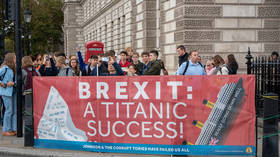Nazi war criminal celebrated by Lithuanian government as hero of WW2 resistance exposed by his own granddaughter in brand new book

American journalist Silvia Foti exposed a major cover-up by the Lithuanian government. Her grandfather, considered a WWII hero in the country, was actually a Nazi mass murderer. Now she’s written a book that tells the real story.
It seems clear that Foti’s grandmother, who begged her not to write about her husband, knew the truth. “Just let history lie,” she whispered to her granddaughter. This week, with the book’s publication, the truth will finally be told: known as an Anti-Soviet partisan, Jonas Noreika, celebrated with monuments in his homeland, was a war criminal who had been personally responsible for having ordered the murder of thousands of Jews in Lithuania during the Holocaust.
One such place was in the western town of Plungė, where Noreika served in the beginning of WWII as commander of the Lithuanian Activist Front, an openly anti-Semitic group that cheered the coming of the Nazis as liberators. Plungė’s entire Jewish population of more than 1,800 was murdered, mostly by local people, within days of their arrival in July 1941.
Also on rt.com Exposed: How British state tries to weaponise Russian-speakers in Baltics as ‘agents of change’ in operation to ‘weaken’ Moscow“While my grandfather’s role in the Holocaust has been painful enough to discover,” says Foti, an American journalist, in an op-ed for the Times of Israel, “what has been equally painful was the discovery of the Lithuanian government’s denial of his role in the Holocaust. This is the 10th stage of genocide – denial that it ever happened.”
In the center of the capital, Vilnius, there is a plaque to Noreika on the Wroblewski Library of the Lithuanian Academy of Sciences, and his name is on a wall commemorating national heroes at the Museum of Occupations and Freedom Fights. His home village boasts a monument and school named after him, and there is a plaque honoring him in a street in the second-largest city, Kaunas. Thirteen years after he was exposed as one of Lithuania’s most prolific Holocaust perpetrators, the government posthumously bestowed on him the president’s highest award: the Order of the Cross of Vytis.
After 20 years of research, Foti’s book, ‘The Nazi’s Granddaughter: How I Discovered My Grandfather was a War Criminal’ was finally published today. Its cover features a quote from a New York Times review: “Blaming Russian propaganda has suddenly become a lot more difficult, thanks to Mr Noreika’s own granddaughter, Silvia Foti.”
Also on rt.com Russian diplomats blast ‘outrageous’ claim by Lithuanian lawmaker that Jewish people themselves were responsible for HolocaustLithuanians have always been quick to accuse Moscow of being behind anything that casts their country in a bad light, but the facts speak for themselves: according to major international research institutions that have studied the Holocaust, especially the Simon Wiesenthal Center, Lithuanian complicity was both widespread and a major reason why 96.4 percent of the country’s pre-1939 Jewish population – which numbered 250,000 – was wiped out. Fewer than a thousand Nazis could not have murdered so many people. They needed, and received, the help of Lithuanians to carry out the horrifying task, which they executed with both enthusiasm and intense cruelty.
Foti’s investigation exposed an official cover-up by the government of the role her grandfather played in the Holocaust. While many Lithuanians see her as a traitor for bringing shame on their country, and have voiced a desire to see her declared a persona non grata, she robustly defends her actions in the NYT op-ed: “Analysis of a dark past is always traumatic. But we will never achieve clarity and healing if we base our history on lies.” Foti declined to be interviewed by RT for this article.
Last month, the head of the Institute of History and three universities declared they could no longer cooperate with the state-funded Genocide and Resistance Research Centre of Lithuania (LGGRTC). Its research, they argued, had become ideologized and politicized, encouraging a “defense of history” and perpetuating “wars of memory.” Its employees, they claimed, were also making irresponsible statements and giving biased information in interviews. These are the very accusations the Lithuanian government makes against Russia.
Also on rt.com Lithuanian President worried Russia could ‘swallow’ troubled Belarus as part of embattled leader Lukashenko’s eventual departureA case in point: the LGGRTC says the activities of Juozas Brazaitis-Ambrazevičius, a former minister of education and the acting prime minister under the provisional government in 1941, during Lithuania’s occupation by Nazi Germany, “were investigated fully by the US Congress and US Immigration and Naturalization Service” and that, in 1974, he “was completely exonerated” of charges that he was a Nazi puppet and Holocaust collaborator.
What the center hides, and continues to deny until today, is that the US investigation was dropped, because Brazaitis-Ambrazevičius died in 1974. No decision regarding either criminally charging or exonerating him was ever adopted. This is confirmed in a 2019 letter from US Congressman Bradley Sherman to the then-prime minister of Lithuania, Saulius Skvernelis. Sherman, whose parents were of Russian-Jewish descent, references documents – inaccessible in 1974 because they were in the Soviet jurisdiction – that testify to Brazaitis-Ambrazevičius’ complicity in the Holocaust.
Seven years earlier, Sherman and two other US congressmen protested at Brazaitis-Ambrazevičius being reburied with full honors. They said it “undermines efforts to counter anti-Semitism and to recognize the crimes of the Nazis and their collaborators. We hope you will take concrete steps to demonstrate your government’s commitment to accurate historical portrayal and recognize the darkest realities of the Holocaust.”
Attempts by RT to make contact with Congressman Sherman were unsuccessful, and correspondence with Grant Gochin, a Lithuanian Jewish American and a serial litigant against the Republic of Lithuania, who made publicly available a list of legal claims against Lithuanian governmental Holocaust revisionism, also went unanswered.
To date, the LGGRTC has merely reinforced, rather than corrected, its misinformation about Brazaitis-Ambrazevičius. It has also tried to discredit Sherman, claiming his opinion should be viewed in the context of his role as a politician and not as a new source of historical information.
The previous director of the LGGRTC, Teresė Birutė Burauskaitė, was neither a historian nor a lawyer, yet claimed to have a greater understanding of the meaning of US Congressional documents than Lithuania’s Congressional allies, and Dalius Stancikas, the current head of public relations for the LGGRTC, continues those falsifications, yet these have the rule of law in Lithuania.
Also on rt.com ‘Flagrant attack on democracy’: Moscow blasts Baltic states for ‘persecuting’ journalists working for Russia-linked outletsThe irony is that Sherman was one of the staunchest promoters of greater co-operation between Vilnius and Washington. He and US Congressmen Henry Waxman and Howard Berman voted for the country’s membership to NATO in 2004 and supported the deployment of the US military in Lithuania, all of which have been of no small benefit to the Baltic state. Trade between the countries amounts to more than $1.9 billion annually and, in 2019, Washington provided Vilnius with approximately $88 million in security assistance.
So, when Valdas Rakutis, a Lithuanian MP from the ruling coalition who was then also chairman of the parliament’s Historical Memory Commission, declared on International Holocaust Remembrance Day in January this year that Jews are also to be blamed for the Holocaust, it is a reflection of the country’s official policy. It is also an indication that the government values maintaining its fraudulent history over offending its strongest ally.
When the prosecutor at the Vilnius District Office subsequently declined to investigate Rakutis’ statements, arguing that Rakutis had no intention of inciting negative public reaction against people of Jewish ethnicity, and had not sought to incite hatred and discord, Vilnius sent a strong message that it would rather risk its national existence than discontinue with its falsifications. In continuing to protect Nazi supporters and enablers, certain questions have to be asked. What kind of value system does Lithuania have, and why would Europe want to be associated with it? And why, when the country has been internationally exposed for having perpetuated propaganda, would Europe afford it credibility on any subject?
Also on rt.com Lithuanian MEP who sold ‘healing water’ to cure Covid under fire over rant about what transgender women have ‘under their skirts’Rakutis’ subsequent resignation from the Historical Memory Commission was – according to Efraim Zuroff, the chief Nazi hunter of the Simon Wiesenthal Center and the director of its Israel office – only because he’d made his statements “on International Holocaust Remembrance Day, in parliament, and there was an international uproar about it.” His views, says Zuroff, “contained all the elements that are official policy in Lithuania.”
The US-based advocacy organization the Israeli-American Civic Action Network (ICAN) has launched an initiative to ensure all 535 members of the US Congress learn about the ongoing Holocaust revisionism campaign perpetrated by Lithuania. “The Lithuanian government not only hides the criminal histories of Holocaust perpetrators, but adds insult to injury by bestowing their highest national honors on those who are proven murderers of Jews. If the Lithuanian government is able to effortlessly lie about history’s greatest crime, then it begs the question: what won’t it lie about?” says Dillon Hosier, ICAN’s CEO.
Foti writes: “My grandfather will remain to me a monster. Those watching are the families of his victims. I know that forgiving is impossible. Only the murdered may forgive and they are not here to do that. So, I ask you to accept my genuine personal apology. I am sorry for the sins of my grandfather and I am sorry for what the Lithuanian government continues to do.”
Think your friends would be interested? Share this story!













